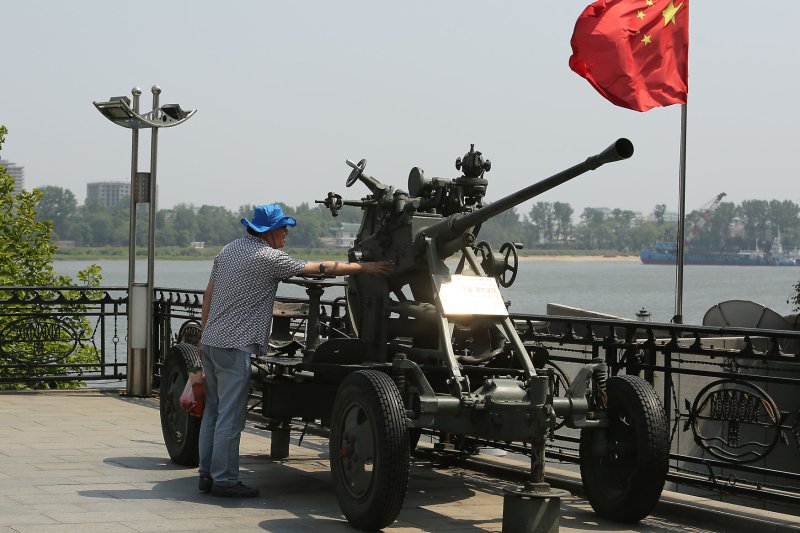By Elizabeth Shim
 NEW YORK, April 30 (UPI) -- China plays an outsize role in North Korea's economy, but its clout in the region doesn't mean Beijing can easily intervene in the event of North Korea instability, U.S. analysts say.
NEW YORK, April 30 (UPI) -- China plays an outsize role in North Korea's economy, but its clout in the region doesn't mean Beijing can easily intervene in the event of North Korea instability, U.S. analysts say.
Neither should the United States' 28,500 troops on the peninsula get involved in a crisis scenario, where Kim Jong Un remains missing and no one in Pyongyang, including Kim's sister Kim Yo Jong, is able to take the reins.
"Certainly, the United States should play a role behind the scenes," said Mitchell Lerner, director of the Institute for Korean Studies at Ohio State University.
"But a U.S. military presence [in North Korea] would likely just exacerbate the situation by inflaming much of the North's population, which has for so long been fed a steady diet of tales of American atrocities."
The United States should provide financial, logistical and intelligence support, but the military needs to stay in the background if at all possible, Lerner told UPI.
Tensions between the United States and North Korea have receded since 2018, when Kim met with President Donald Trump at a historic summit. Despite several North Korean short-range missile tests, Trump has professed a special relationship with the North Korean leader, whose last reported public appearance was April 11. Rumors have swirled that he is in ill health.
But ordinary North Koreans are indoctrinated to deeply resent Americans at an early age for their role in the 1950-53 Korean War, at sites like the Sinchon Museum of American War Atrocities.
Terry Roehrig, professor of national security affairs at the U.S. Naval War College, told UPI during a recent Korea Economic Institute webinar that the domestic nature of regime instability rules out external involvement.
"If there is something wrong with Kim Jong Un's health, and he passes away, that is an internal political issue," Roehrig said. "I don't think the United States should or can necessarily intervene."
While the world's biggest military superpower would be recommended to sit out a potential North Korea collapse, such a scenario could invite China -- which shares an 880-mile border with the reclusive country, to respond -- particularly if it affects Chinese control of its northeastern region.
"China does have a critical role to play in a North Korean contingency," said Soo Kim, a policy analyst at the RAND Corp. "But Beijing will only consider crossing into the North Korean side of the border if the situation in North Korea interrupts China's own stability.
"Should there be instability in North Korea, the benefit of China's involvement in the contingency to the United States and allied interests will be limited."
In the event of a regime downfall or coup, neither Beijing nor Washington, not to mention Seoul, could be ready for what might follow.
U.S.-China relations has reached its lowest point in decades as accusations fly amid the coronavirus pandemic. Discussing North Korea as COVID-19 cases continue to rise may be the least of Trump's, and President Xi Jinping's priorities.
"It is very important the United States, China and South Korea have had discussions about this, because if we decide to act, there's an awful lot of room to get in each other's way," Roehrig said.
"China would perhaps be more willing and certainly better placed to move into North Korea if there was some indication of extreme instability" in a country that has developed nuclear and chemical weapons, he added.
Lerner, who agrees the Chinese could cross the border in a "worst-case scenario," said the friendship between China and North Korea is somewhat exaggerated. The North Koreans are wary of Chinese intrusion.
"They really don't have the close fraternal and ideological bonds that most Americans seem to think. And the Kims have always jealously guarded their control of North Korea against Chinese encroachment," the analyst said. "One suspects that the next leader, whether it is a Kim family member or someone else, will feel the same way."
As Kim's disappearance raises stability questions, the Trump administration may have been raising the risk of decoupling from a key ally, South Korea. A short-term defense burden-sharing agreement expired at the end of 2019. Meanwhile, South Korean workers at U.S. military bases were furloughed on April 1, and a reported South Korean offer of a 13 percent increase in contributions has not been formally accepted in Washington. U.S. officials have asked as much as $5 billion annually from Seoul.
"The worst possible message, but one that is not surprising," Lerner said. "Trump sees foreign policy only through the lens of dollars and cents."
Soo Kim says the policy is sowing doubt and mistrust among South Koreans.
"It's one thing if this contention were confined at the top levels only; it becomes a larger, messier issue once it seeps out to the public. And it has."
No comments:
Post a Comment